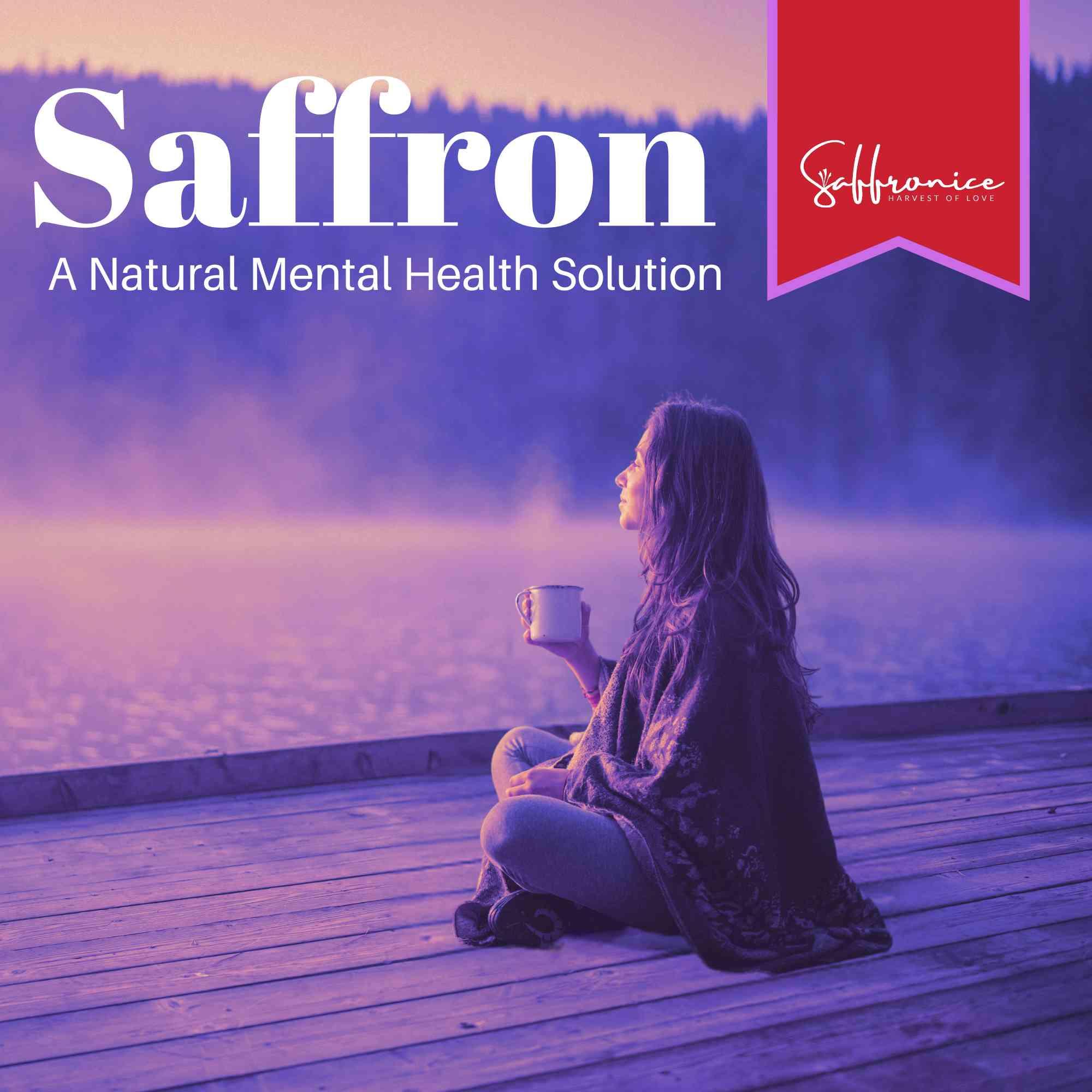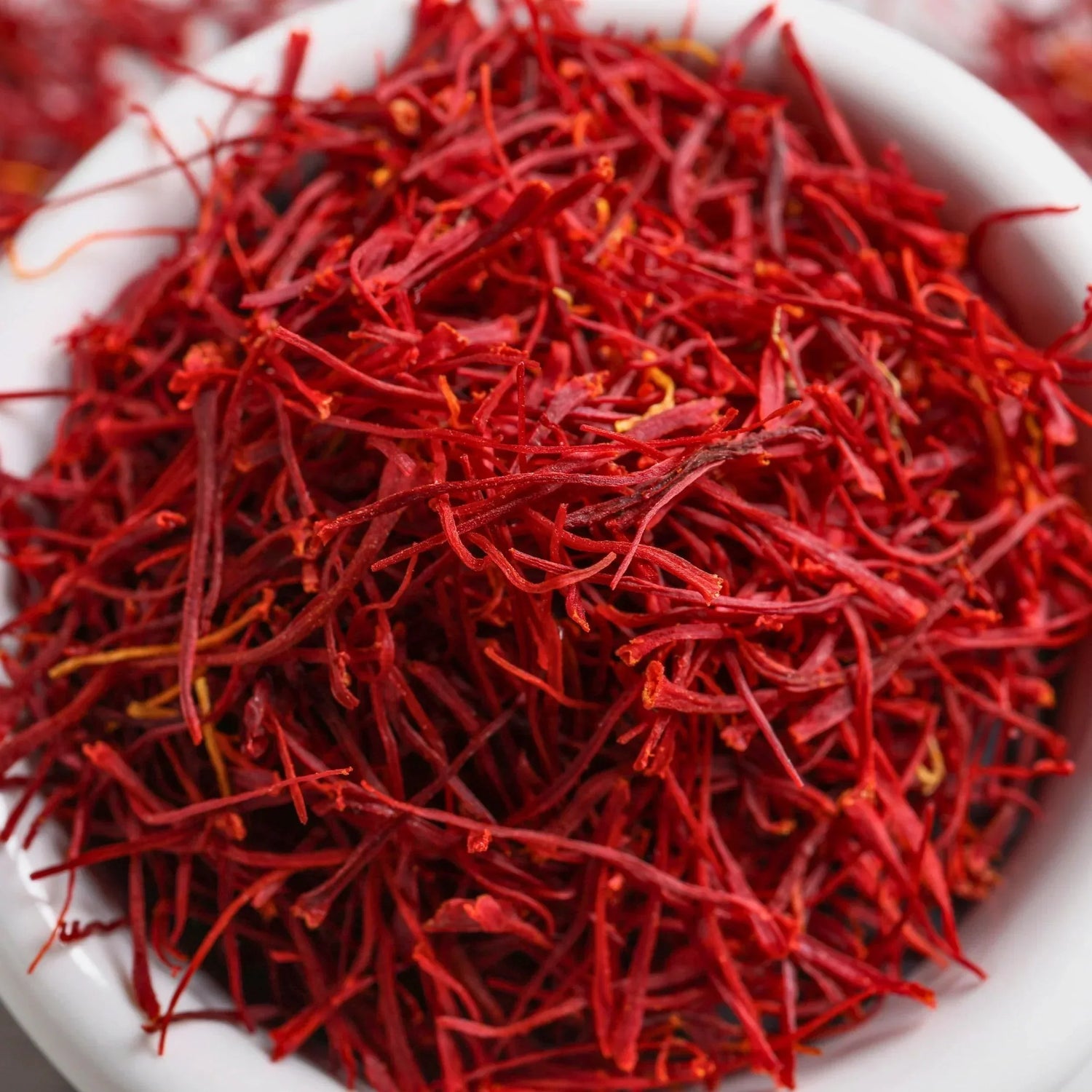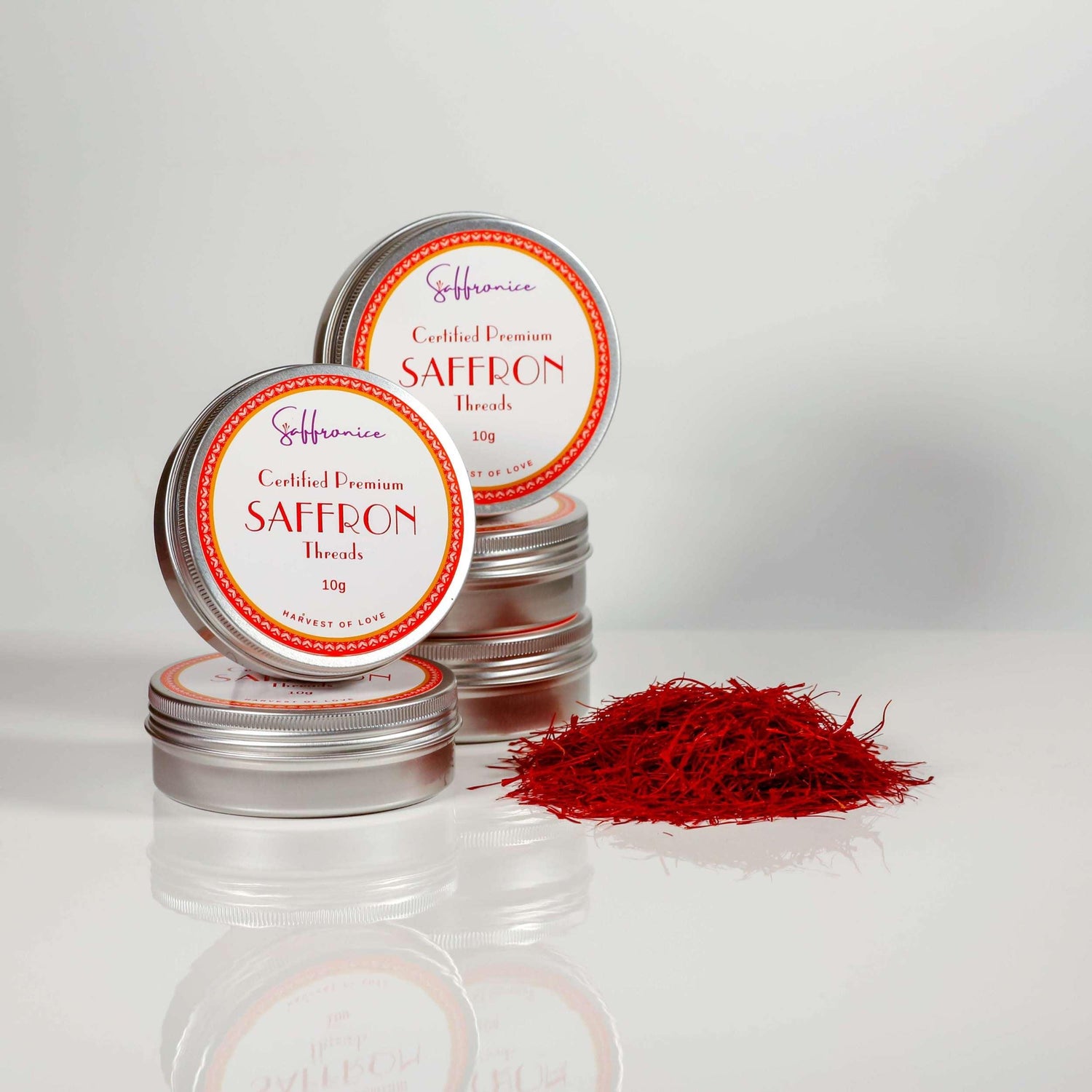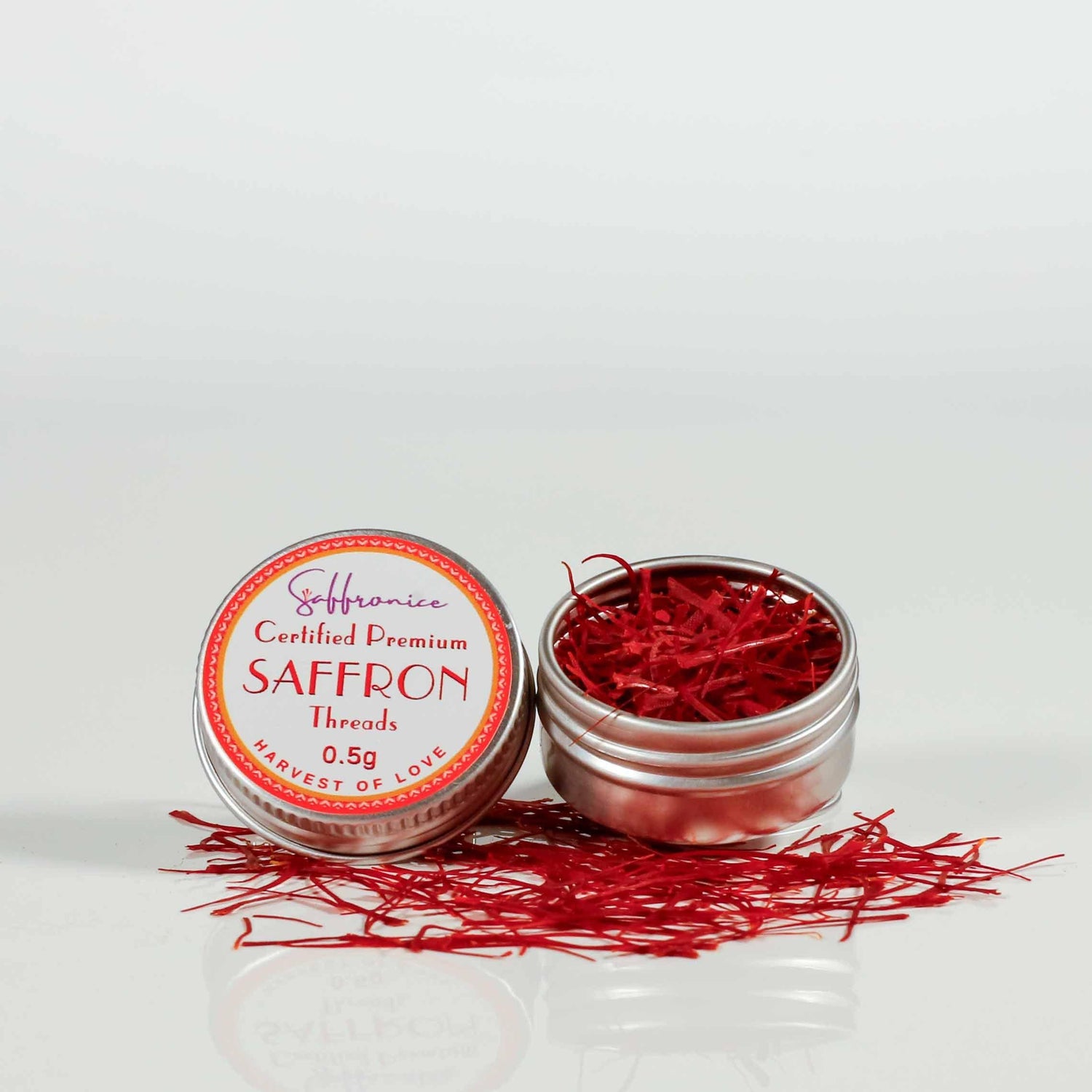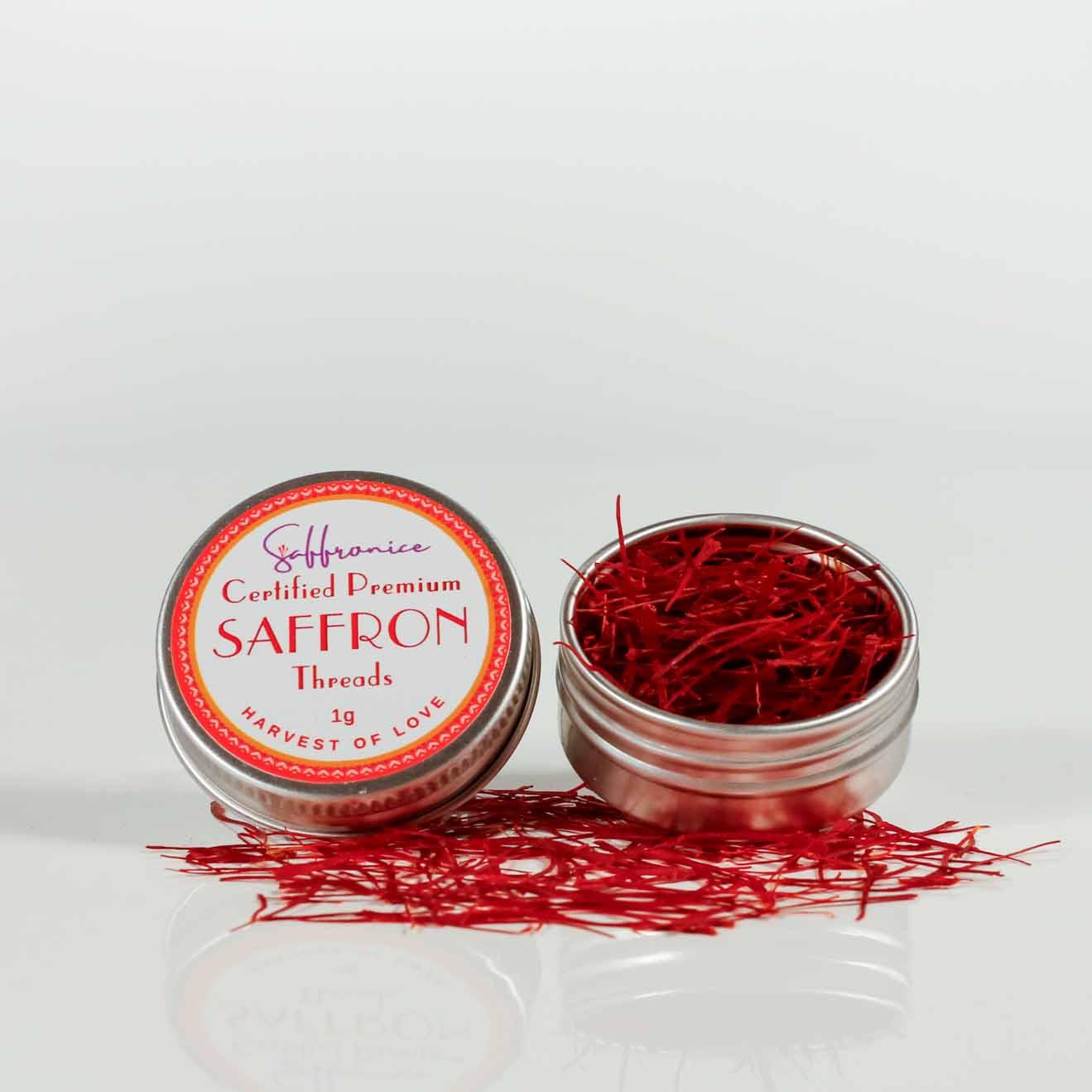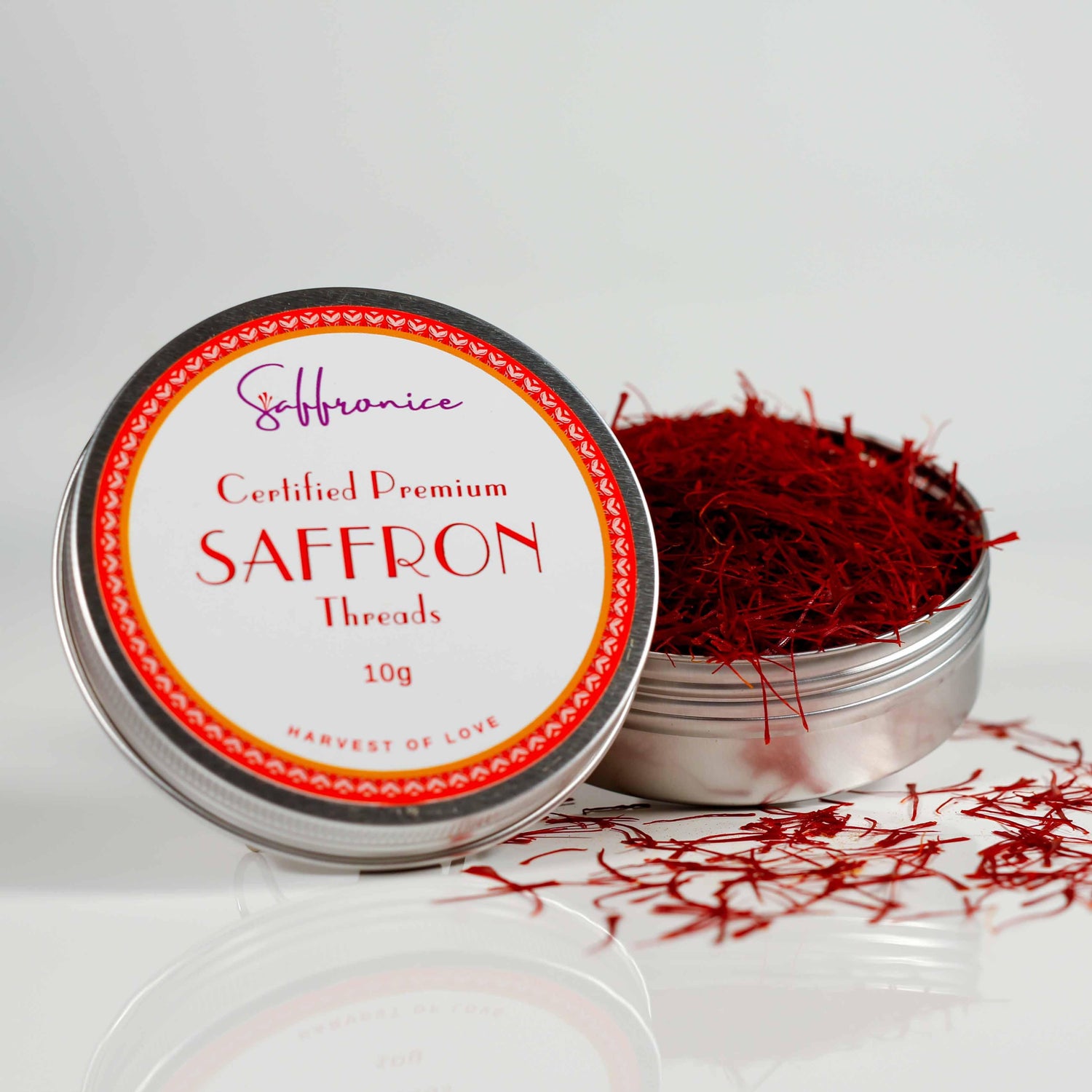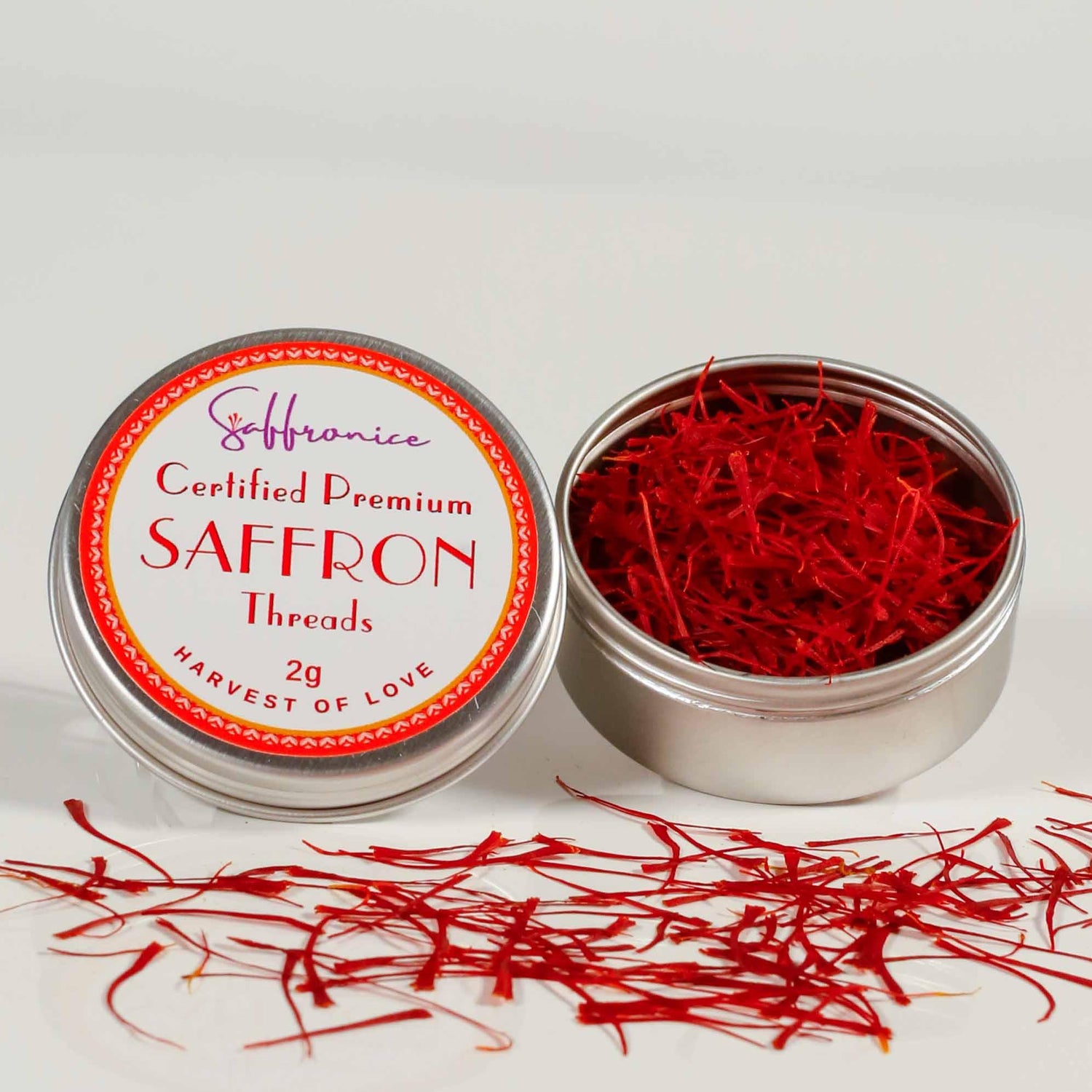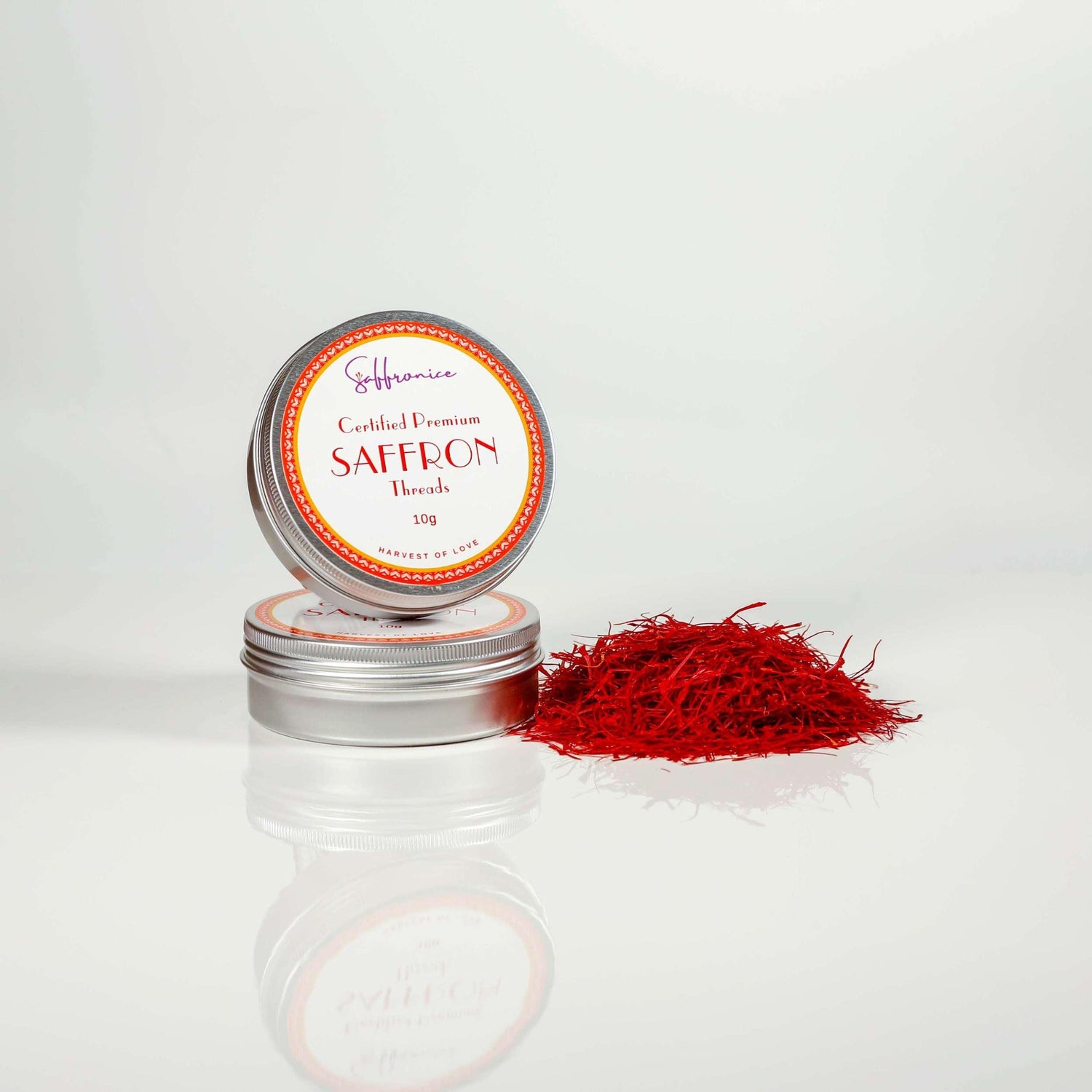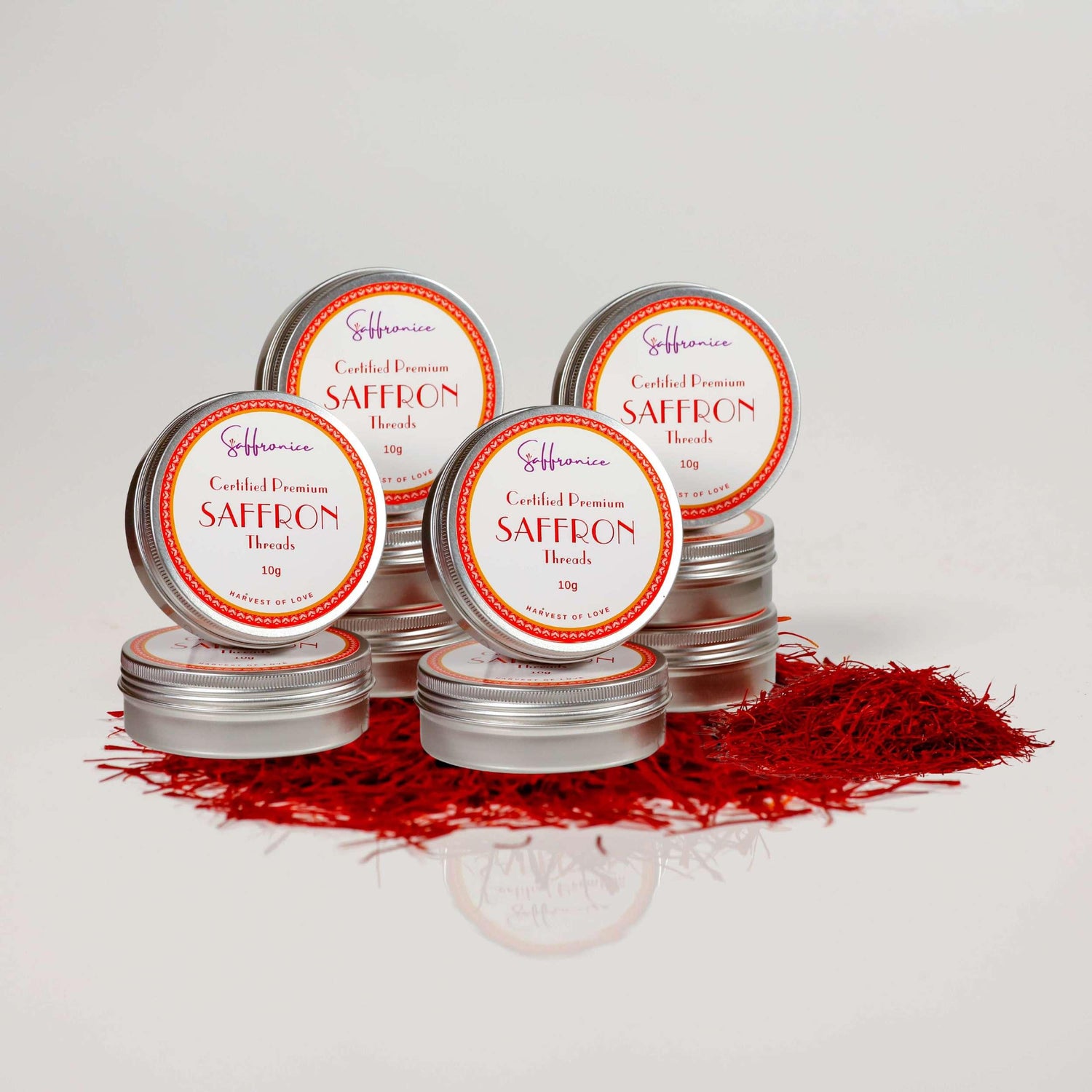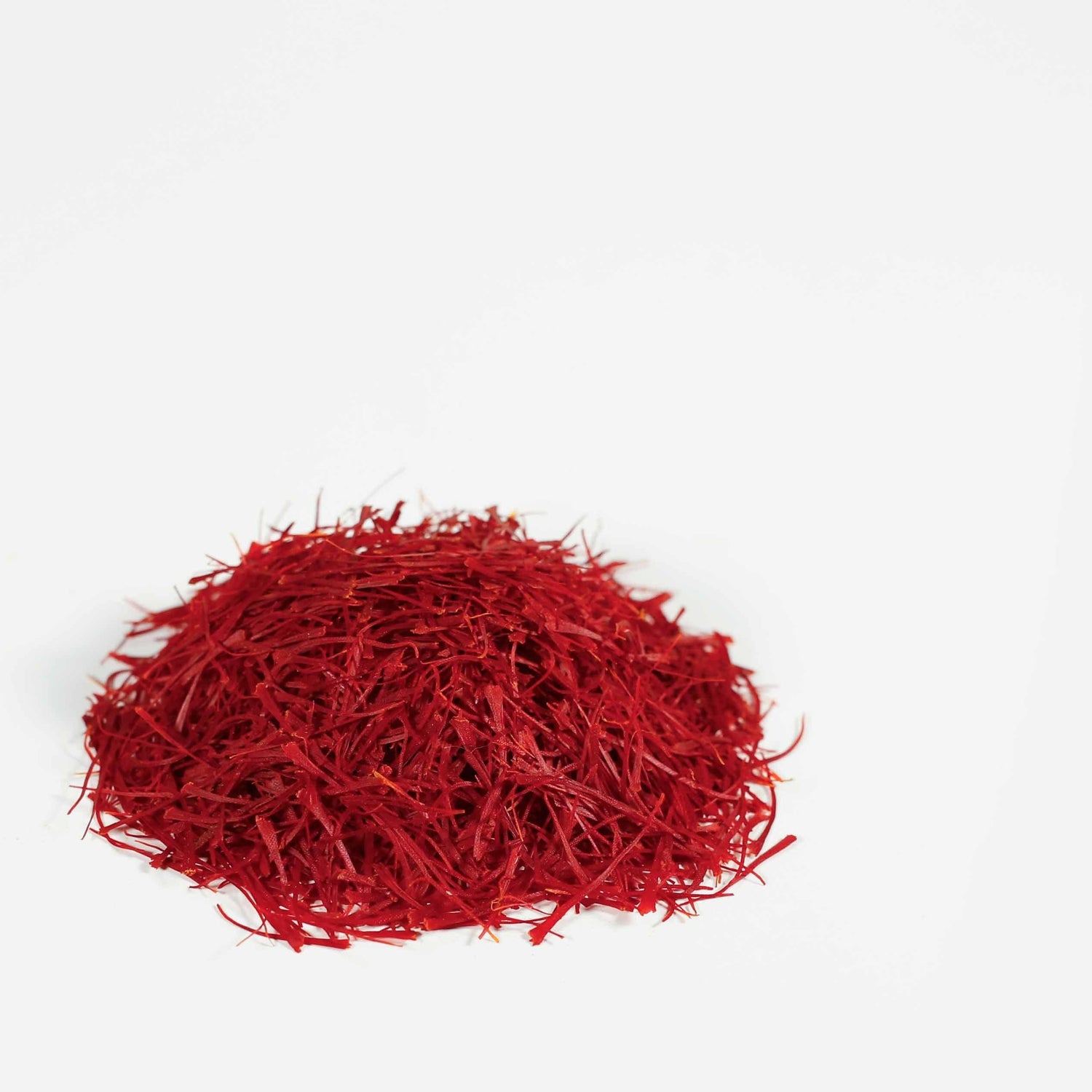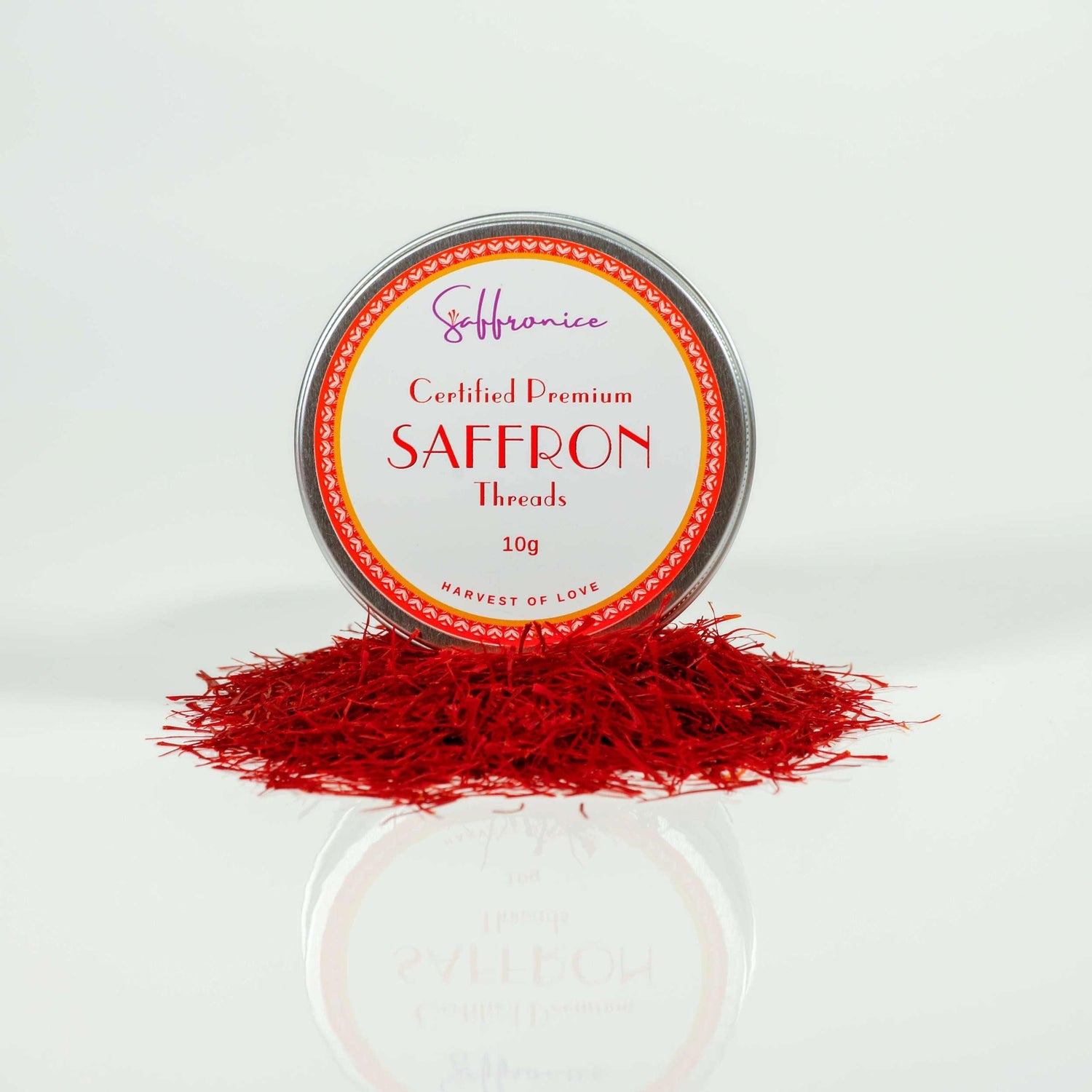Saffron: A Colourful History
Welcome to the vibrant and intriguing world of saffron – a spice as rich in history as in colour and flavour. Known scientifically as Crocus sativus L., widely recognised for its use in saffron supplements, it has been a prized ingredient in kitchens and pharmacies for millennia.
The Global Tapestry of Saffron
Historically, Saffron's journey began in the ancient lands of Persia, weaving its way through the tapestry of human history. Its deep red threads have coloured and flavoured cuisines across the globe, from the fragrant Biryani of India to the sumptuous Risottos of Italy. But Saffron's role extends far beyond culinary arts. In history records, this precious spice has been used as a dye, a component in perfumes, even a form of currency and its historical transformation into a sought-after saffron supplement.

Saffron's Transition to Medicinal Use
The transition of saffron from a mere kitchen staple to a powerful medicinal herb is a fascinating evolution, underscored by a wealth of scientific research. Studies published in journals such as the 'Journal of Ethnopharmacology' and 'Phytotherapy Research' have illuminated the diverse applications of saffron and contributed to the development of saffron supplements.
Saffron in Modern Health Science
These include its use as an antioxidant, an anti-inflammatory agent, and, most intriguingly, as a potential treatment for various neurological conditions. These properties have led to the increased popularity of saffron supplements in modern health science. An 'Evidence-Based Complementary and Alternative Medicine' study highlighted Saffron's neuroprotective properties, providing a scientific basis for its traditional use in boosting memory and cognitive function.
The Promise of Saffron for Mental Health

Recently, the focus has shifted to Saffron's potential mental health benefits. Research has delved into its antidepressant properties, with clinical studies suggesting that saffron may be as effective as certain conventional medications in treating mild to moderate depression. This ancient spice, once treasured by pharaohs and kings, is now at the forefront of modern scientific research, indicating the potential of saffron supplement in treating mental health issues. Proving that its value extends far beyond its weight in gold.
Embarking on a Saffron Journey
As we embark on this journey through the world of saffron, we'll uncover how this extraordinary spice, a treasure of the ancient world, significantly impacts today's world of natural health and wellness. Stay tuned as we explore the incredible benefits of saffron, not just as a culinary delight but as a powerful supplement with the potential to uplift and heal.
Saffron's Journey from Spice to Supplement:
The Art of Cultivating Saffron
Delving into Saffron's cultivation process reveals a story of meticulous labour and dedication. The cultivation of Crocus sativus L., the plant from which saffron is derived, is a task that requires precision and care. Each saffron crocus flower blooms for only a few weeks each year and contains three delicate red stigmas. These stigmas are handpicked to preserve their quality and aroma, typically during the early morning. It's a labour-intensive process: approximately 150,000 flowers are needed to produce just one kilogram of saffron. This painstaking effort contributes to Saffron's status as one of the most expensive spices in the world.
Saffron's Transformation into a Health Supplement
The journey of saffron from a traditional spice to a modern health supplement is marked by extensive scientific research. Numerous studies have investigated Saffron's therapeutic potential, particularly its application in mental health. For instance, a research study published in the 'Journal of Psychopharmacology' examined the efficacy of saffron in treating mild to moderate depression, highlighting its promise as a natural antidepressant. Another significant study in 'Complementary Therapies in Medicine' looked into Saffron's anti-inflammatory and antioxidative properties, providing insights into its broader health benefits.
Standardisation and Potency in Supplement Form
In its transformation into a supplement, the consistency and potency of saffron are paramount. The process involves careful extraction and standardisation to ensure that each supplement dose contains an optimal concentration of active ingredients like crocin and safranal. This standardisation is crucial for Saffron's effectiveness as a supplement, as noted in studies such as 'Phytotherapy Research', which emphasises the importance of consistent quality in herbal supplements for therapeutic use.
The Growing Popularity of Saffron Supplements
The emergence of saffron as a supplement has opened new avenues for its application in health and wellness. With growing interest in natural remedies and holistic approaches to health, saffron supplements have gained popularity among individuals seeking alternatives to synthetic medications. This transition is supported by a growing body of scientific evidence, making saffron supplements a promising addition to natural health products.
Understanding Depression
A Widespread Global Health Issue
Depression, characterised by persistent sadness, loss of interest, and a range of emotional and physical problems, has become a critical challenge in modern society. According to the World Health Organization (WHO), depression is a leading cause of disability worldwide, affecting millions of people. Its impact extends beyond the individual, affecting families, workplaces, and societies. The societal toll of depression includes reduced productivity, strained healthcare resources, and, in severe cases, an increased risk of suicide. The pervasiveness of this condition reflects a need for a more in-depth understanding and effective management strategies.
The Need for Alternative Therapies in Depression Treatment
Traditional treatments for depression typically involve pharmaceutical interventions, such as antidepressants and psychotherapy. However, these conventional methods are not always practical for all individuals and often come with various side effects. This limitation has led to significant research into saffron supplements as an alternative therapies. A study published in the 'American Journal of Psychiatry highlights the potential of natural supplements, including saffron, as effective adjuncts or alternatives to traditional antidepressant medications. The study emphasises the lower side effect profile and overall tolerability of these natural treatments, making them a valuable option for those who struggle with standard treatment regimes.
Research on Natural Remedies for Depression
Increasing evidence suggests that certain natural substances, including herbs like saffron, could offer significant benefits in the treatment of depression. Research published in the 'Journal of Ethnopharmacology explores the antidepressant effects of various natural compounds, noting their potential as complementary or alternative treatment options. These studies advocate for the effectiveness of such remedies and emphasise their role in providing a holistic approach to mental health care, addressing the need for effective and well-tolerated by patients.
Saffron and Mental Health: A Natural Beacon of Hope
![]()
Saffron's Efficacy in Treating Depression: Insights from Research
The potential of saffron in treating depression has been a subject of keen interest in the scientific community. A groundbreaking study published in the 'Journal of Affective Disorders investigated the impact of saffron on individuals with depression. This study provided compelling evidence that saffron significantly reduced depression symptoms, comparable to traditional antidepressant medications. The findings suggest that saffron, with its active compounds like crocin and safranal, can influence mood-regulating pathways in the brain, offering a natural and effective option for managing depression. This has elevated the role of saffron supplement in mental health care.
Comparing Saffron with Conventional Antidepressants
In the realm of mental health treatment, the comparison of saffron with conventional antidepressants marks a significant area of research. Another study featured in 'Phytotherapy Research' delved into this comparison, examining the efficacy of saffron against common antidepressants such as fluoxetine and imipramine. The results indicated that saffron was not only effective in alleviating depressive symptoms but also had fewer side effects compared to its pharmaceutical counterparts. This aspect is particularly noteworthy, as the tolerability and safety of treatment options are crucial considerations in managing long-term mental health conditions.
Saffron's Role in Holistic Mental Health Care
The emerging research on saffron positions it as a promising candidate in the landscape of mental health care. Its potential benefits extend beyond just symptom management; studies suggest that saffron may also play a role in improving overall emotional well-being and quality of life for individuals with depression. This aligns with a holistic approach to mental health, focusing on treating the individual rather than merely addressing symptoms.
The Bioactive Powerhouses of Saffron

Unlocking the Secrets of Crocin, Picrocrocin, and Safranal
At the heart of Saffron's remarkable therapeutic properties lie three potent compounds: crocin, picrocrocin, and safranal. These bioactive molecules each play a distinct role in Saffron's health benefits. Crocin, the compound responsible for Saffron's vibrant colour, has been studied for its antioxidant and neuroprotective effects. A study published in the 'Journal of Pharmacopuncture details how crocin can influence neurological pathways, potentially aiding in the treatment of conditions like depression and anxiety.
Picrocrocin, on the other hand, gives saffron its bitter taste. Research in the 'Pharmacognosy Review' has highlighted its role in mood regulation, suggesting that picrocrocin could contribute to Saffron's antidepressant effects. Furthermore, this compound is also known for its antioxidant properties, adding another layer to Saffron's multifaceted health benefits.
Safranal, which imparts the distinctive aroma of saffron, is not just a sensory delight. It has been shown to have sedative and anxiolytic effects, offering potential benefits in the management of stress and anxiety disorders. The 'Journal of Pharmacopuncture study also sheds light on safranal's role in enhancing cognitive function and its potential neuroprotective benefits, further reinforcing Saffron's value in mental health treatments.
Linking Saffron's Compounds to Therapeutic Applications
Crocin, picrocrocin, and safranal synergy give saffron powerful therapeutic capabilities. These compounds work together to influence various biochemical pathways in the body, offering a holistic approach to health and wellness. Their combined effects on mood regulation, cognitive function, and neuroprotection position saffron as a unique and potent natural remedy, particularly in mental health. As research continues to unfold, understanding these compounds and their interactions promises to deepen, opening new avenues for natural, effective treatments for various health concerns.
Saffron as a Natural Antidepressant: Scientific Insights 
Clinical Evidence of Saffron's Antidepressant Properties
The journey of saffron in mental health has been illuminated by clinical trials, with notable research published in 'Human Psychopharmacology'. These studies provide substantial evidence of Saffron's effectiveness as a natural antidepressant. In one such trial, participants suffering from mild to moderate depression were administered saffron extracts. The results demonstrated a significant reduction in depression symptoms compared to the control group, highlighting Saffron's potential as a viable alternative to conventional antidepressant medications.
Understanding Saffron's Mechanisms of Action
Delving into the mechanisms behind Saffron's antidepressant effects, these clinical trials suggest multiple pathways through which saffron impacts mental health. The studies point towards Saffron's influence on serotonin, a key neurotransmitter involved in mood regulation. Saffron appears to act similarly to selective serotonin reuptake inhibitors (SSRIs), a typical class of antidepressants, by enhancing serotonin levels in the brain.
Additionally, the antioxidant properties of Saffron's compounds, particularly crocin and safranal, play a role in combating oxidative stress, often linked to depression. The trials also indicate that saffron may have neuroprotective effects, contributing to overall brain health and functioning, which is crucial in managing depression.
The Broader Implications of Saffron's Antidepressant Effects
These clinical insights into Saffron's antidepressant mechanisms open up new possibilities in the treatment of depression. With its natural origin and lower side-effect profile, saffron presents a promising alternative for those seeking more holistic and tolerable treatment options. As research expands, Saffron's role in mental health care could redefine approaches to treating depression, offering a blend of traditional wisdom and modern scientific understanding.
Harnessing Saffron Supplements for Mental Wellness 
Formulation and Standardisation: The Key to Effective Saffron Supplements
The transformation of saffron into a supplement form is a meticulous process, essential for ensuring both efficacy and safety. A significant aspect of this transformation, as discussed in the journal Complementary Therapies in Medicine, involves the standardisation of saffron extracts. This process guarantees that each dose of a saffron supplement contains a consistent amount of active ingredients, primarily crocin, picrocrocin, and safranal. Standardisation is critical in herbal supplements; it ensures that consumers receive the therapeutic benefits of saffron and maintains the supplement's quality and potency over time.
Saffron Supplements vs. Traditional Antidepressants
A Comparative Perspective
When comparing saffron supplements with traditional antidepressants, several benefits emerge. Firstly, as highlighted in studies from 'Complementary Therapies in Medicine', saffron supplements generally have a lower risk of side effects compared to conventional antidepressant medications. This aspect makes saffron an appealing option for individuals sensitive to the side effects of traditional pharmaceuticals.
Additionally, saffron supplements offer a more holistic approach to mental health. Unlike many antidepressants that target specific neurotransmitters in the brain, saffron works through multiple pathways. Its antioxidant and anti-inflammatory properties contribute to overall brain health. At the same time, its mood-regulating effects directly impact symptoms of depression.
The Growing Appeal of Saffron in Mental Health Management
The medical community increasingly recognises the appeal of saffron supplements in managing mental wellness. Their potential to provide a natural, effective, and well-tolerated treatment option aligns with the growing interest in integrative and holistic health approaches. As more individuals seek alternatives to traditional medications, saffron supplements stand out as a promising and valuable tool in the arsenal against depression.
The Future of Saffron Supplements in Mental Health Care 
Evolving Role of Saffron Supplements in Modern Therapy
As we gaze into the future of mental health care, the role of saffron supplements appears increasingly significant. Insights from 'Phytomedicine' and other leading medical journals indicate a growing trend towards incorporating natural remedies into mainstream mental health treatment. With their proven efficacy and safety profile, Saffron supplements are poised to become a key player in this evolving landscape. The ongoing research suggests a potential shift in how depression and other mood disorders are managed, moving towards a more integrative approach that combines traditional medical treatments with natural alternatives.
Increased Research and Potential Mainstream Acceptance:
The body of research on the mental health benefits of saffron is expanding rapidly. Studies are delving deeper into its mechanisms of action, exploring how its various compounds interact with brain chemistry to alleviate symptoms of depression. This growing corpus of evidence paves the way for broader acceptance of saffron supplements within the medical community. Mental health professionals are beginning to recognise the value of these supplements, not only as standalone treatments but also as adjuncts to conventional therapies.
A Future with Holistic Mental Health Solutions
The potential for saffron supplements to be integrated into standard mental health protocols is promising. This integration signifies a broader shift in healthcare that values holistic, patient-centred approaches. As we move forward, we can anticipate a mental health care paradigm that embraces the efficacy of natural supplements like saffron, offering patients diverse treatment options. This inclusive approach could transform how mental health is understood and treated, making care more personalised and effective.
Saffron Supplement – A Ray of Hope in the Darkness of Depression
As we conclude this exploration of saffron supplement and its role in mental health, it's clear that this ancient spice, revered for centuries, holds new promise in the modern world. The scientific evidence compiled from various studies, including those in journals like 'Journal of Affective Disorders' and 'Phytotherapy Research', provides a compelling case for Saffron's benefits in treating depression. These benefits, ranging from its antidepressant properties to its safety and tolerability, position saffron as a valuable tool in the battle against depression.
Saffron's active compounds – crocin, picrocrocin, and safranal – have been shown to interact with critical neurotransmitters in the brain, offering a natural means to enhance mood and alleviate depressive symptoms. The potential of saffron supplements, standardised for potency and consistency, provides a natural, effective, and well-tolerated alternative or adjunct to traditional antidepressant medications.
Looking ahead, the future of mental health treatment is bright with the potential integration of natural remedies like saffron supplements. Ongoing research supports the efficacy and safety of these alternatives, suggesting a more holistic and personalised approach to mental health care. Saffron, with its rich history and promising therapeutic properties, stands as a beacon of hope, offering a natural, gentle, and effective option for those navigating the challenges of depression.
In a world where mental health issues are increasingly prevalent, the significance of safe and effective treatment options cannot be overstated. Saffron's emergence in this realm is a testament to the wisdom of ancient remedies and a reflection of modern science's ability to validate and harness these natural gifts. As we move forward, the incorporation of saffron supplements and similar natural remedies in mental health care holds the promise of a more inclusive, effective, and compassionate approach to treating depression.
Link to a few scientific studies below, we encourage you to do your own research as there are plenty of resources online.
- Crocus sativus L. in the treatment of mild-to-moderate depression
- Neuroprotective Potency of Saffron Against Neuropsychiatric Diseases
- Therapeutic Effects of Medicinal Herbs on Depression
- Saffron for depression: a systematic review of clinical studies and examination
Interested in learning more about Saffron's health Benefits & Risks?


